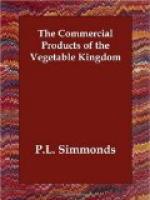Immense quantities of the capsicum are used by the native population of the West Indies, Africa, and Mexico; the consumption as a condiment being almost universal, and perhaps equal in quantity to salt. Ten barrels of these peppers were shipped from Montego Bay, Jamaica, in the first six months of 1851.
The wholesale price of chillies in the London market is from 15s. to 25s. the cwt., and there is a duty of 6d. per pound on them. Cayenne fetches 9d. to 2s. the pound.
Chilli is the Mexican name for all varieties of Capsicum. They are natives of the East and West Indies, and other hot climates. C. annuum is the species commonly noticed, but there seems to be numerous varieties, which by many are reckoned species. Thus, C. frutescens is a shrubby plant, which, along with C. minimum, supplies the variety called bird-pepper, it grows to a larger and more bushy size; C. baccatum has a globular fruit, and furnishes cherry or berry capsicum. They are all of the simplest culture, and may even be grown with very little care in England. Culture appears to increase the size, but to diminish the pungency of the fruit. In capsicums irritant properties prevail so as to obscure the narcotic action. Their acridity is owing to an oleaginous substance called capsicin. Cayenne pepper is used in medicine chiefly in the form of tincture, as a rubefacient and stimulant, especially in cases of ulcerated sore throat. It acts on the stomach as an aromatic condiment, and when preserved in acetic acid it forms chilli vinegar.
Red pepper may be considered one of the most useful vegetables in hygiene. As a stimulant and auxiliary in digestion it has been considered invaluable, especially in warm countries. A kind called the tobacco red pepper, is said to possess the most pungent properties of any of the species. It yields a small red pod, less than an inch in length, and longitudinal in shape, which is so exceedingly hot that a small quantity of it is sufficient to season a large dish of any food. Owing to its oleaginous character, it has been found impossible to preserve it by drying, but by pouring strong boiling vinegar on it a sauce or decoction can be made, which possesses in a concentrated form all the essential qualities of the vegetable. A single drop of this sauce will flavor a whole plate of soup or other food.
The “wort” or Cayenne pottage may be termed the national dish of the Abyssinians, as that, or its basis “dillock,” is invariably eaten with their ordinary diet, the thin crumpet-like bread of teff or wheat flour. Equal parts of salt and the red cayenne pods are well powdered and mixed together with a little pea or bean meal to make a paste. This is called “dillock,” and is made in quantities at a time, being preserved in a large gourd-shell, generally suspended from the roof. The “wort” is merely a little water added to this paste, which is then boiled over the fire, with the addition of a little fat meat and more meal to make a kind of porridge, to which sometimes is also added several warm seeds, such as the common cress or black mustard, both of which are indigenous in Abyssinia.—("Johnston’s Abyssinia.”)




